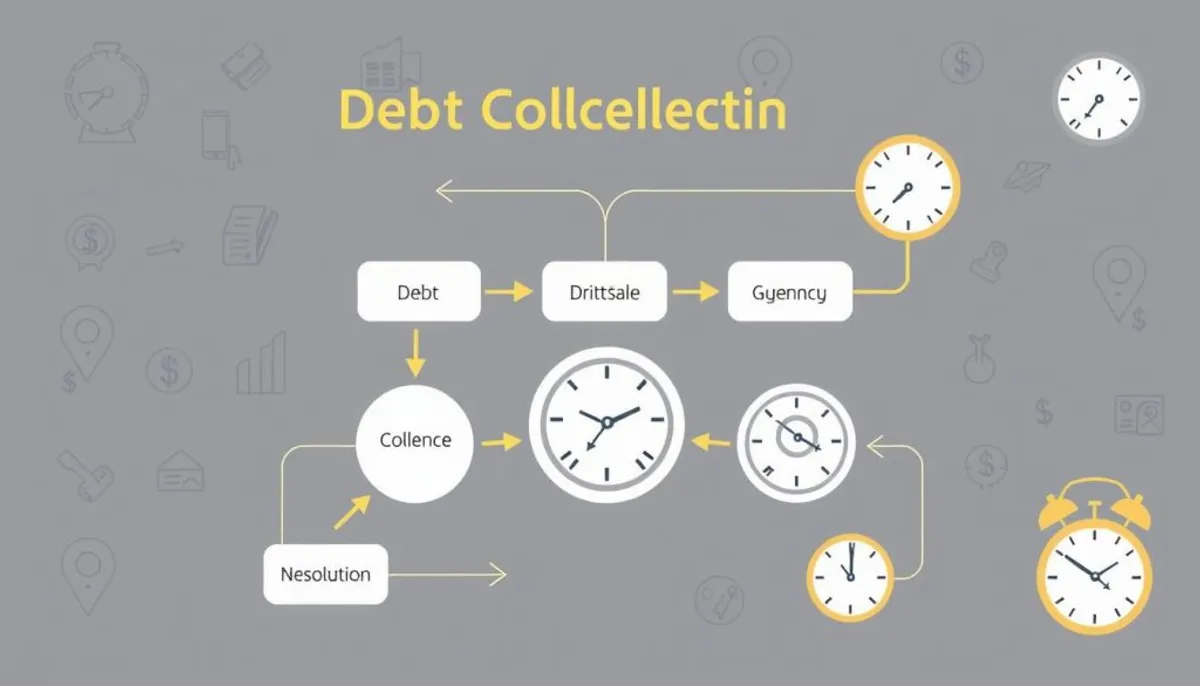Debt collection practices are fundamental to the financial system. Creditors frequently struggle to recover delinquent debt portfolios. Selling these debts to collection agencies is a viable solution. It enables creditors to recoup some losses and shifts the collection responsibility to specialized firms.
Collection agencies purchase debts at a fraction of their face value, aiming to profit from full recovery. This legal practice is governed by state and federal laws. The Fair Debt Collection Practices Act (FDCPA) outlines the rules for debt collectors, safeguarding consumers against unfair practices.

Creditors have the right to sell or transfer debt without debtor consent. Upon sale, the collection agency becomes the debt owner. They must prove ownership and provide accurate debt documentation when seeking payment. This ensures transparency and safeguards debtors from fraudulent claims.
Key Takeaways
- Debt sales to collection agencies are legal and common in the financial industry
- The FDCPA protects consumers from abusive debt collection practices
- Debt collectors must provide written notice within five days of initial contact
- Debtors have the right to dispute debts and request verification
- Collection agencies must respect written requests to cease communication
- State laws vary on debt collection statutes of limitations
- Seek professional help if experiencing abusive collection practices
Understanding Debt Sales and Collection Agencies
Debt sales are pivotal in the financial sector. Creditors often sell past-due accounts to third-party debt buyers when they believe debtors are unable to pay. This typically occurs when debts are 90 days or more overdue.
What Constitutes a Debt Sale
A debt sale involves the transfer of charged-off accounts from original creditors to collection agencies. These agencies purchase debts for less than their actual value, aiming to recover the full amount. This practice allows creditors to recoup some losses and focus on active accounts.
Role of Collection Agencies in Debt Purchase
Collection agencies act as third-party debt buyers, acquiring delinquent accounts to pursue payment. They employ various methods, including phone calls, letters, and legal action threats. The Fair Debt Collection Practices Act (FDCPA) regulates these activities, protecting consumers from abusive practices.
Legal Framework for Debt Sales
Consumer protection laws govern debt sales and collection practices. The FDCPA sets guidelines for debt collector behavior, prohibiting harassment and deceptive tactics. State-specific regulations may also apply, adding layers of consumer safeguards.
| Aspect | Details |
|---|---|
| Debt Sale Timing | Typically 90+ days past due |
| Collection Agency Role | Purchase and recover debts |
| Key Regulation | Fair Debt Collection Practices Act |
| Statute of Limitations | 7-10 years for debt reporting |
Can I Sell a Debt to a Collection Agency
Selling debt to collection agencies is a common practice for creditors seeking to recover unpaid balances. With consumer debt in the U.S. reaching nearly $14.9 trillion in 2020, many businesses are exploring this option. Debt sale regulations allow creditors to transfer their rights to third-party debt buyers, providing an opportunity for immediate cash flow.
Creditors have the right to sell various types of debt, including credit card balances, medical bills, and personal loans. The process typically begins when payments are missed for about six months. Before proceeding with a sale, it’s crucial to compile and verify all relevant documentation to ensure compliance with debt sale regulations.
When considering selling debt, creditors should identify reputable third-party debt buyers and solicit offers. It’s essential to understand the terms of the sale and finalize the agreement through a legally binding contract. Seeking legal advice can help protect creditor rights throughout the process.
| Aspect | Details |
|---|---|
| Debt Sale Timeframe | Typically after 6 months of missed payments |
| Credit Report Impact | Negative marks remain for 7 years |
| Statute of Limitations | Generally 3-6 years for debt collection |
| Creditor Benefits | Immediate cash flow, resource allocation |
Selling debt to collection agencies is becoming increasingly popular due to potentially higher returns and the ability to originate new loans. By understanding debt sale regulations and working with reputable third-party debt buyers, creditors can effectively manage their portfolios while maintaining compliance with consumer protection laws.
Types of Debt Eligible for Sale
Debt sales encompass a variety of financial obligations. It is essential for creditors and debt buyers to comprehend the categories of debt eligible for sale. This knowledge aids in navigating the complexities of debt transactions. Let’s examine the different types of debt that can be sold and their distinct characteristics.
Secured Debt Options
Secured debts are collateralized, offering lenders a protective measure. These include:
- Mortgages
- Auto loans
- Commercial real estate notes
Unsecured Debt Categories
Unsecured debts, lacking collateral, constitute a substantial portion of delinquent debt portfolios. They encompass:
- Credit card balances
- Student loans
- Personal loans
- Medical bills
- Utility bills
Age and Status Requirements
Debt can be sold at various stages of delinquency. Charged-off accounts are frequently sold, yet even fresh accounts can be included. The age of debt significantly influences its value and collectibility.
| Debt Type | Credit Report Duration | Collection Attempt Limitation |
|---|---|---|
| General Collections | 7 years | 3-6 years (varies by state) |
| Medical Collections | 7 years (if $500+) | 3-6 years (varies by state) |
| Charge-offs | 7 years | 3-6 years (varies by state) |
Consumer protection laws are pivotal in debt sales. Debt buyers must comply with these regulations when collecting on purchased debts.
Benefits of Selling Debt to Collection Agencies
Selling debt to collection agencies presents several benefits for creditors. This approach aligns with contemporary debt collection practices. It respects creditor rights and utilizes the expertise of third-party debt buyers.
Immediate Cash Flow Benefits
Creditors can swiftly monetize outstanding debts by selling them to collection agencies. This immediate influx of cash enables businesses to reinvest in their core operations. It also opens up new lending opportunities.
Operational Cost Reduction
Outsourcing debt collection to specialized agencies significantly reduces operational expenses. Creditors no longer have to maintain in-house collection teams. They also avoid the costs of expensive recovery processes.
Resource Allocation Advantages
By selling debts, companies can redirect their focus and resources towards customer acquisition and service improvement. This shift in resource allocation often leads to enhanced business performance and growth.
| Benefit | Impact |
|---|---|
| Immediate Cash Flow | Quick monetization of outstanding debts |
| Cost Reduction | Decreased operational expenses |
| Resource Optimization | Focus on core business activities |
| Risk Mitigation | Reduced legal and financial risks |
Selling debt to collection agencies not only improves financial ratios but also provides valuable market insights. It helps identify gaps in loan issuance processes and debtor scoring systems. This leads to more informed lending decisions in the future.
Introducing ti3: A Modern Alternative to Debt Collection
In the ever-changing world of debt collection, ti3 stands out as a transformative SaaS platform. It addresses the widespread problem of late payments, impacting 89% of small-to-medium enterprises. Given that only 38% of invoices are paid on time, ti3 brings relief to businesses burdened by delinquent debt portfolios.
Ti3 transforms the handling of overdue accounts through automated reminders and streamlined payment collection. This method respects consumer protection laws while offering a more effective alternative to traditional debt collection agencies. It allows users to quickly sign up and tackle unpaid accounts, thus preserving crucial client relationships.
The platform tackles major challenges faced by businesses:
- Reduction of the average £6,142 outstanding balance per late invoice
- Minimizing the 14 hours per week spent on payment-related administrative tasks
- Decreasing the need for multiple reminders, as 30% of invoices require three or more follow-ups
By providing a cost-effective solution, ti3 enables businesses to sidestep the £5,000 annual cost typically incurred in recovering late payments. This innovative approach to debt collection not only enhances cash flow but also safeguards customer relationships. It emerges as a crucial asset for businesses of all sizes.
Legal Considerations and Compliance Requirements
Selling debt to collection agencies requires navigating a complex regulatory landscape. Creditors must grasp their rights and duties while adhering to consumer protection laws. The Fair Debt Collection Practices Act (FDCPA) serves as the cornerstone for ethical debt collection in the United States.
Fair Debt Collection Practices Act
The FDCPA delineates the roles of debt collectors and consumers, imposing restrictions on communication and disclosure. It bars abusive practices that could precipitate personal bankruptcies or job losses. Creditors must ensure that debt buyers adhere to these federal mandates.
State-Specific Regulations
Each state has its own set of laws governing debt collection. These regulations can influence the statute of limitations for debt collection and may mandate additional requirements for debt buyers. Creditors must thoroughly research state-specific rules before engaging in debt sales.
Consumer Protection Laws
Consumer protection laws are designed to shield debtors from predatory practices. These laws restrict when and how collectors can contact consumers about debts. They also safeguard consumer privacy by limiting the disclosure of debt information to third parties.

| Debt Type | Percentage Sold | Key Risks |
|---|---|---|
| Credit Card | Majority | Operational, Reputation |
| Auto Loans | Moderate | Compliance, Strategic |
| Mortgages | Minor | Legal, Financial |
Creditors must meticulously assess potential debt buyers to mitigate risks associated with debt sales. The Office of the Comptroller of the Currency holds lenders accountable for compliance violations by third-party vendors. This underscores the criticality of selecting reputable debt buyers.
The Debt Sale Process and Documentation
The process of selling debt to collection agencies is intricate, requiring meticulous documentation. Third-party debt buyers are pivotal in this transaction, notably with charged-off accounts. Grasping the steps and requirements is vital for a seamless debt transfer.
Required Documentation
Creditors must furnish detailed documentation to debt buyers when selling debt. This includes original loan agreements, payment histories, and debtor information. The Fair Debt Collection Practices Act mandates collectors to send a debt validation letter within five days of initial contact. This ensures transparency and adherence to legal standards.
Transfer Procedures
The transfer process involves negotiating terms with the debt buyer and executing a legally binding contract. It’s noteworthy that creditors can sell debt without the debtor’s consent. Once sold, collection agencies typically contact debtors by phone or in writing. The debt may change hands multiple times if repayment agreements are not met.
Verification Steps
Verification is a critical component of the debt sale process. It confirms the accuracy of debt information and ensures legal compliance. This step helps mitigate risks associated with debt sales. Debt buyers must possess licenses for debt buying and collection, adhere to state regulations, and maintain data security policies. Membership in professional bodies like RMAI or ACA International signifies credibility.
Remember, delinquent debt can negatively impact credit scores for up to seven years. It’s imperative for debtors to negotiate repayment plans with collection agencies to settle debts and minimize long-term financial repercussions.
Evaluating Potential Debt Buyers
When contemplating the sale of debt to third-party entities, a meticulous evaluation of potential buyers is paramount. This diligence is vital to uphold compliance with debt sale regulations and consumer protection laws.
It is imperative that potential debt buyers are legal entities, possessing the requisite licenses for debt acquisition and collection. They must also have insurance, internal data security policies, and a team of qualified professionals. Membership in organizations such as RMAI or ACA International often signifies adherence to industry benchmarks.
Conducting thorough due diligence on potential buyers is crucial to mitigate risks associated with reputation and legal compliance. Utilizing professional debt trading platforms that uphold stringent standards for buyer verification is advisable. These platforms ensure that buyers adhere to necessary qualifications and ethical practices.
It is noteworthy that debt buyers typically acquire past-due accounts at a fraction of the original debt amount. For instance, they might offer $100 for a $1,000 debt, with the intention of profiting from full collection. This strategy enables creditors to recoup some value from debts that were previously deemed uncollectible.
- Check for proper licensing and insurance
- Verify membership in professional organizations
- Assess internal policies for data security
- Use reputable debt trading platforms
- Understand the typical purchase price for debts
Through a comprehensive evaluation of potential debt buyers, creditors can facilitate a more efficient transaction process. This approach ensures compliance with relevant regulations and safeguards consumer rights.
Impact on Customer Relationships
Selling debt to collection agencies can significantly affect customer relationships. Businesses must balance financial needs with maintaining positive customer connections. This delicate balance requires careful planning and execution.
Communication Strategies
Clear communication is key when transferring debt. Inform debtors about the sale promptly. Explain why the debt was sold and who now owns it. This transparency helps maintain trust and creditor rights. Be sure to comply with consumer protection laws throughout this process.
Consider these communication tips:
- Send written notices detailing the debt transfer
- Provide contact information for the new debt owner
- Offer a grace period for customers to adjust
Brand Protection Measures
Protecting your brand is crucial when selling debt. The actions of debt buyers can impact your reputation. Implement these brand protection strategies:
- Choose reputable collection agencies
- Set guidelines for ethical debt collection practices
- Monitor agency performance regularly

Consider including clauses in your debt sale agreement to prevent resale or establish collection practice guidelines. This helps maintain control over how your former customers are treated.
| Impact Factor | Percentage |
|---|---|
| Typical debt sale discount | 10% – 40% |
| Overdue period before sale | 90+ days |
| Immediate cash flow benefit | 100% of sale price |
By prioritizing ethical debt collection practices and clear communication, you can minimize negative impacts on customer relationships while addressing financial needs.
Pricing and Valuation Factors
Several elements influence the price and value of a delinquent debt portfolio when sold. Third-party debt buyers meticulously evaluate these factors to establish fair pricing for charged-off accounts.
Age of Debt Impact
The age of debt is a critical determinant of its value. Older debts generally command higher discounts due to their reduced collectibility. Despite advancements in digital debt collection tools, the passage of time remains a pivotal factor.
Portfolio Size Considerations
The size of a delinquent debt portfolio significantly impacts pricing. Larger portfolios often secure better rates due to economies of scale for debt buyers. Smaller agencies, on the other hand, frequently employ the Multiple of Discretionary Earnings method for valuation. This method considers factors such as client concentration and staff quality.
Market Conditions
Economic factors and industry trends play a significant role in determining debt prices. The collection agency industry generates over $11.99 billion annually, with nearly 7,780 agencies operating in the US. This competitive environment influences the pricing dynamics for charged-off accounts.
| Factor | Impact on Pricing |
|---|---|
| Debt Age | Older debts sell at higher discounts |
| Portfolio Size | Larger portfolios may secure better rates |
| Market Conditions | Economic factors influence pricing |
| Collection Rate | Successful firms achieve 10%+ collection rates |
Grasping these factors is essential for sellers to make well-informed decisions when negotiating with third-party debt buyers for their delinquent debt portfolios.
Conclusion
Selling debt to collection agencies presents creditors with a practical solution for managing overdue accounts. This method can offer immediate financial relief and enhance operational efficiency. It is, though, essential to consider the potential risks and legal responsibilities involved.
Creditors must navigate a complex environment of debt collection practices, creditor rights, and consumer protection laws. The Fair Debt Collection Practices Act imposes stringent regulations, limiting contact hours and frequency. It is imperative to collaborate with reputable buyers who comply with industry standards, as set by organizations like RMAI and ACA International.
While selling debt can improve cash flow and business ratios, it comes with its own set of challenges. Creditors must consider the impact on customer relationships and brand reputation. Modern alternatives, such as ti3, offer innovative solutions that balance financial needs with ethical considerations.
The decision to sell debt should be in line with long-term business objectives. By grasping the legal framework, carefully evaluating potential buyers, and prioritizing consumer rights, creditors can make decisions that benefit their financial health while upholding ethical standards in debt collection practices.
RelatedRelated articles



